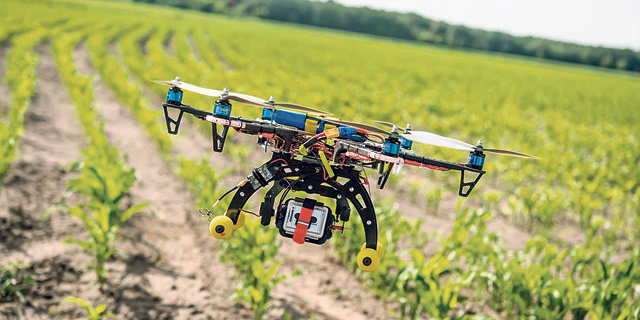
Food security startups awarded almost $3 million in grants by Ministry of Agriculture, Israel Innovation Authority
BioFishency, Agrint Sensing Solutions, Tosaf Compounds, ALTA, FruitSpec, and Salicrop were the six agro-tech startups selected for the program for their innovation aimed at ensuring continued regular supply of agricultural products
CTech | 13:16, 26.01.22
The Ministry of Agriculture and Rural Development and the Israel Innovation Authority have selected six agro-tech startups for a new joint grant program for companies engaged in ensuring the regular supply of fresh food (food security). The joint committee will fund up to 70% of the pilots aimed at promoting technological improvement in the field. The winning companies were selected from 17 startups that specialize in the development of food products or industrial raw materials based on plants or animal products, as well as developments designed to improve and streamline production during the growing stages. A total of NIS 8.6 million (approximately $2.7 million) will be awarded to the companies, with half of the amount transferred from the Ministry of Agriculture and Rural Development, and the other half from the Innovation Authority.
The winning startups will each receive support of up to 60% of the pilot's budget, with companies conducting the pilot in national priority areas receiving an additional 10% funding. In addition, the companies will be able to take their development to the next stage, through a pilot program to be held in active farms or in the R&D centers of the Ministries of Agriculture and Science, across Israel. This will provide farmers with access to advanced technologies and at the same time, the startup companies will gain access to regular agricultural operations that will enable them to optimize their developments.
"Food security is our responsibility, the Ministry of Agriculture is investing billions in research and development,” said Director General, Ministry of Agriculture and Rural Development, Naama Kaufman-Pess. “This is the only way we can continue to strengthen agriculture and prepare optimally for times of crisis and in particular for climate change.”
Israel Innovation Authority CEO, Dror Bin: "As part of the joint pilot program for Israel Innovation Authority and the Ministry of Agriculture, Israel is funding the first implementation activity of advanced technologies for Israeli farmers. The purpose of the program is twofold: to provide an opportunity for first implementation of advanced technologies for Israeli startups and to allow Israeli citizens to enjoy the innovation developed locally.”
The six selected companies are:
BioFishency: The company is developing an automated and controlled system for the treatment of industrial fish farming ponds (RAS). These systems allow intensive rearing of fish with negligible water consumption. In ponds of this type, due to the density of the fish, large amounts of organic matter are excreted into the water. BioFishnecy's system treats water and substances excreted in the water. Among other things, the system turns ammonia into nitrogen gas, and disinfects the growth water in a way that can prevent the outbreak of diseases and improve the living habitat of the fish. The pilot trial is expected to bring the company closer to marketing the system, by examining the actual growth 24/7 over a number of growth cycles. In addition, the pilot will help establish a model farm that will assist in promoting sales both in Israel and abroad.
Agrint Sensing Solutions INC.: The company is developing a sophisticated seismic sensor for early and precise detection of caterpillar-infested trees (apple, pear, olive, almond, avocado, cherry, plane, mango, and more). The product offers monitoring that will enable accurate pest control and the prevention of irreversible damage. This is a solution suited for plantation owners, municipalities, private and public gardens, that allows them early detection of pests. The sensor enables 24/7 monitoring of the tree, early detection, and reporting to the customer via an app.
Tosaf Compounds: The company has developed an innovative UV radiation stabilizer concentrate for polyethylene sheets used to cover agricultural greenhouses. The product is mainly used in environments with high levels of pesticides. The uniqueness of this new product is its ability to save up to 25% on the cost of stabilizers compared to competing NOR-based products, which are patented and manufactured by only a small group of European manufacturers.
ALTA: Drone company Alta has developed a solution for precise spraying of plant products using drones. The ALTA drone performs an initial scan of the area, from which the images are uploaded to the company's artificial intelligence system for detection of foci weeds. Accordingly, the drone is dispatched to spray the pesticides only at points identified by the AI system. This method makes it possible to effectively deal with weeds, while reducing the extent of pesticide use, and provide farmers with cost saving on fixed expenses.